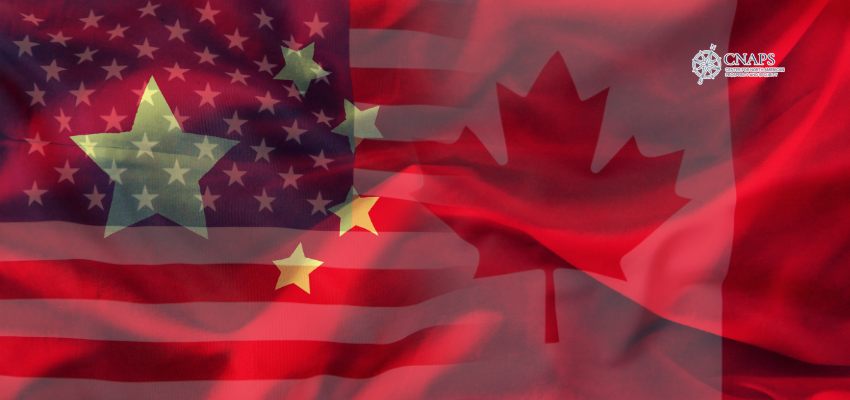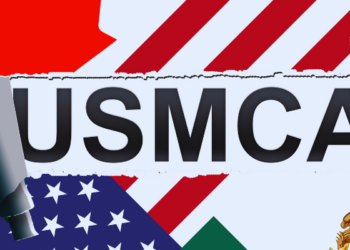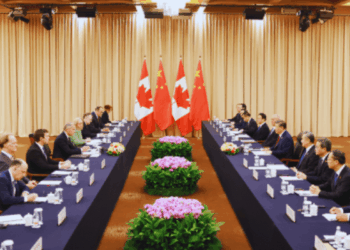This article originally appeared in Real Clear World.
By Stephen Nagy, September 4, 2025
President Donald Trump’s tariff threats and aggressive negotiation tactics are placing unprecedented strain on the Canada-United States relationship. As Canada struggles to navigate these choppy trade waters, China is seizing the moment to sow discord and fracture North America’s long-standing security partnership.
Beijing has systematically deployed influence operations designed to exploit these frictions – seeking to erode trust in Canada among its NORAD and NATO allies, while advancing a narrative across the West that Canada is an unreliable partner for AUKUS and QUAD involvement.
At the same time, China positions itself as a reliable partner: These tactics are part of a well-developed approach – China’s Marxist-Leninist organizational model – that promotes the use of wedge tactics and other ploys to fragment rival coalitions and influence foreign governments.
A recent Canadian government inquiry revealed considerable Chinese interference activities in the country. There are several structural factors that leave Canadians especially vulnerable to China’s influence efforts, which are widespread and deep-rooted.
Beijing’s institutional approach: The United Front Work Department (UFWD)
China’s influence operations in Canada operate through the United Front Work Department (UFWD), a Chinese Communist Party (CCP) organ that coordinates overseas influence activities. According to the 2023 report by the National Security and Intelligence Committee of Parliamentarians (NSICOP), the UFWD maintains extensive networks within Canada’s Chinese diaspora communities, business associations, and academic institutions. The report documented how UFWD-affiliated organizations have “cultivated relationships with Canadian politicians at all levels of government” through a combination of political donations, community events, and business opportunities.
Re-affirming the NSICOP, Canada’s Public Inquiry into Foreign Interference in Federal Electoral Processes and Democratic Institutions details how the UFWD leverages cultural associations, media collaborations, and grassroots groups to “amplify pro-China narratives, suppress dissent, and align diaspora groups with the CCP’s agenda.” Its network is “sophisticated and enables Beijing to carry out influence operations while masking its role behind ostensibly independent organizations.”
The Canadian Security Intelligence Service (CSIS) has repeatedly warned about UFWD activities. In a 2021 report titled Foreign Interference Threats to Canada’s Democratic Process, CSIS identified the UFWD as coordinating “clandestine and deceptive” operations targeting Canadian political figures. These operations intensified during periods of Canada-US tension, with UFWD-linked organizations increasing their outreach to Canadian politicians precisely when bilateral relations with Washington deteriorated.
Notwithstanding the above well document investigations and interference into Canada’s democracy, scholars and organizations continue to advocate for Canada to normalize relations with Beijing.
Economic incentives and elite capture
China’s influence strategy heavily relies on economic incentives targeting Canadian business elites and political figures. The 2020 House of Commons Special Committee on Canada-China Relations documented how Chinese state-owned enterprises systematically offered lucrative contracts and board positions to former Canadian politicians and their family members. The committee’s report, A Threat to Canadian Sovereignty, detailed how these economic relationships created advocates for Beijing’s positions within Canada’s policymaking circles.
Former Canadian Ambassador to China David Mulroney testified before the committee that “China has been remarkably successful in convincing Canadian business leaders that their prosperity depends on accommodating Beijing’s political demands.” This economic leverage became particularly potent during US-Canada trade disputes, with Chinese officials explicitly presenting their market as an alternative to US economic pressure as outlined in the white paper titled China’s Position on Some Issues Concerning China-U.S. Economic and Trade Relations, which was released by the State Council Information Office of the People’s Republic of China in April 2025.
The documented case of the Canada-China Foreign Investment Promotion and Protection Agreement (FIPA) illustrates this dynamic. Despite CSIS warnings about sovereignty implications, Canada ratified the agreement in 2014 with strong support from business lobbies that had received substantial Chinese investments. Internal government documents released under Access to Information requests revealed that Chinese officials explicitly linked FIPA ratification to increased investment opportunities for Canadian firms, creating what one briefing note called “conflicting loyalties” among Canadian negotiators.
Weaponizing accusations of racism
Beijing has systematically employed accusations of anti-Asian racism to deflect criticism and divide Canadian society. The 2023 report by the Macdonald-Laurier Institute, “Targeting Canada in Service to China’s Global Agenda,” examines where Chinese diplomatic officials or state media accused Canadian institutions of racism when they investigated Chinese influence operations or criticized Beijing’s policies.
Following the 2021 declaration by Parliament that China’s treatment of Uyghurs constituted genocide, Chinese Ambassador Cong Peiwu stated that Canada was “influenced by anti-Chinese and anti-Asian sentiment,” despite the motion being based on extensive human rights documentation. This tactic proved particularly effective in multicultural Canadian society, with several documented cases of politicians withdrawing criticism of Beijing after being accused of racism.
The “racism card” has been effective in undermining Canada-US cooperation on China policy. When Canada considered joining US initiatives on technology restrictions or investment screening, Chinese officials and affiliated organizations launched campaigns accusing both countries of “racist containment” of China. These campaigns, documented in a 2022 Public Safety Canada assessment, successfully delayed several joint Canada-US initiatives by creating domestic political pressure within Canada.
The “Peaceful Development” narrative
China’s influence operations consistently promote a narrative of peaceful intentions while simultaneously engaging in aggressive activities. The 2023 final report of Canada’s Commission on Foreign Interference documented how Chinese diplomats publicly emphasized “win-win cooperation” while privately threatening Canadian citizens of Chinese origin who criticized Beijing.
This peaceful rhetoric has been particularly effective in contrasting China with what Beijing characterizes as American “hegemonic bullying.” During the Trump administration’s tariff threats, Chinese officials intensified their “peaceful partner” messaging. Ambassador Cong’s 2023 comments to the Canada-China Business Council explicitly contrasted China’s “reliable partnership” with “unpredictable neighbors,” a clear reference to the United States.
Impact on Canada-US relations
Chinese influence operations have measurably impacted Canada-US security cooperation. The 2022 Five Eyes intelligence assessment, partially declassified by the Communications Security Establishment, Canada’s cryptologic agency, noted that Chinese operations had “successfully delayed or prevented several joint Canada-US initiatives on critical technology protection and investment screening.”
These delays manifested in three critical security decisions. Canada’s two-year hesitation to ban Huawei from 5G networks (2019–21) created what Pentagon officials termed a “security gap” in continental telecommunications. CSIS documented “intensive Chinese lobbying” that prevented Canadian participation in the US-led Clean Network initiative, while Chinese threats to divest from Canadian pension funds blocked Ottawa from adopting CFIUS-style investment screening in 2020-2021. Each case demonstrated Beijing’s ability to exploit economic leverage and elite relationships to fracture North American security coordination.
Structural impediments to Canadian response
Canada’s inability to respond decisively to Chinese interference stems from three interconnected factors. First, extensive business interests create powerful constituencies opposing firm action. The Canada-China Business Council’s 2022 member survey revealed that 73 percent of respondents opposed stronger investment screening measures, despite acknowledging security concerns.
Second, political conflicts of interest have paralyzed decision-making. The 2023 NSICOP report documented cases where political figures with family business interests in China consistently opposed interference investigations. While not naming individuals due to classification, the report noted “concerning patterns of political intervention” when security agencies attempted to investigate Chinese influence operations.
Third, Canada’s foreign policy establishment maintains what former CSIS Director Richard Fadden called an “idealistic worldview” that Canada can balance relations with both superpowers. This perspective, rooted in Canada’s historical role as a middle power, fails to recognize what the 2023 Canadian Department of National Defence policy update acknowledged as “an era of strategic competition where neutrality enables adversary objectives.”
The long game of division
While current Canada-US tensions create immediate policy challenges, the documented pattern of Chinese influence operations reveals a systematic effort to exploit these frictions for long-term strategic advantage. Beijing’s multifaceted approach that combines UFWD coordination, economic incentives, accusations of racism, and peaceful rhetoric. This approach has successfully delayed Canadian alignment with US security initiatives while creating dependencies that complicate future policy choices.
The evidence demonstrates that China views periods of Canada-US tension not as temporary opportunities but as moments to institutionalize division through elite capture, economic dependencies, and narrative warfare. As Canada navigates current bilateral difficulties with Washington, policymakers must recognize that Beijing’s influence operations aim not merely to provide an alternative partner but to fundamentally restructure North American security cooperation. The documented success of these operations in delaying joint initiatives, creating policy paralysis, and establishing conflicting interests within Canadian institutions suggests that without decisive action, temporary bilateral tensions risk becoming permanent strategic vulnerabilities exploited by an adversarial power.
Stephen Nagy is a professor of Politics and International Studies at the International Christian University. A senior fellow at the Macdonald-Laurier Institute (Ottawa) and the Center for North American Prosperity and Security (DC), Nagy also served as a visiting fellow at the Hungarian Institute for International Affairs (HIIA), and a distinguished fellow at the Corvinus Institute for Advanced Studies (CIAS), at Corvinus University, Budapest








